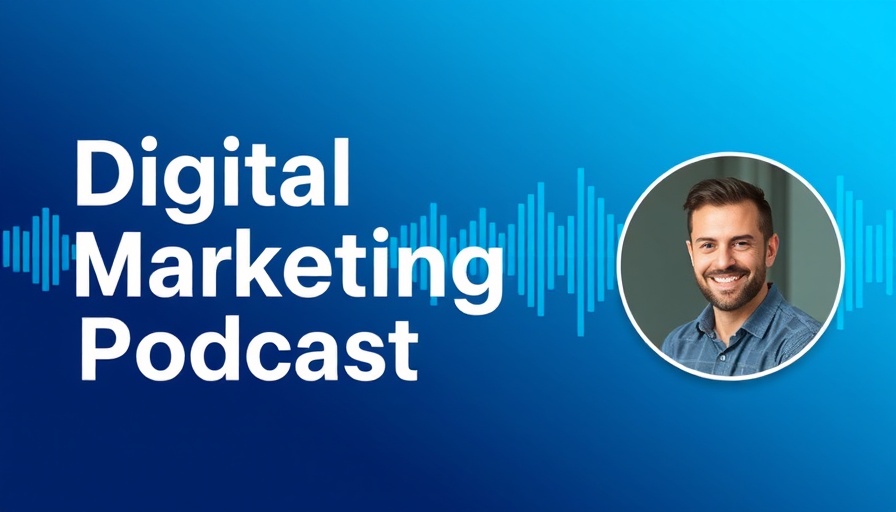
Understanding the Power of Small Businesses in Today's Economy
In recent discussions on the B.A. Marketer podcast, hosted by Dave Shest and Kelsey Carter, they delved into inspiring insights from Carissa Reiniger, founder and CEO of Silver Lining. Carissa’s mission? To change the global economy one small business at a time. With her experience rooted deep in behavioral science, she urges us to recognize the true potential of small businesses—not as mere afterthoughts in economic conversations but as pivotal players in driving change and fostering community resilience.
In 'Changing Your Behavior to Build a Stronger Business with Carissa Reiniger,' the discussion dives into the transformative ideas surrounding small business resilience and effective marketing strategies, prompting us to expand on these key insights.
Why Small Businesses Matter: A Social Approach
Small businesses are often considered the backbone of local communities. As Carissa points out, many small entrepreneurs come from marginalized backgrounds, facing systemic challenges that are far beyond just economic downturns. These individuals exhibit resilience that is truly admirable; they aim to provide opportunities not just for themselves but for others in their community. Carissa’s encouraging narrative makes clear: small businesses significantly contribute to the global economy by addressing social issues such as gender inequality and economic disparities.
Behavioral Change: The Heart of Business Success
The mechanisms that help define success in small businesses are often subtle but profound. Carissa emphasizes that while achieving financial goals is crucial, modifying behavior to align with these goals is equally, if not more, important. Her software platform assists small business owners in setting achievable goals and reconfiguring their strategies for the best outcomes. This prompts the rising question: how can understanding human behavior facilitate better business practices?
Pay What You Can: A Model of Inclusivity
Interestingly, Silver Lining operates on a 'pay what you can' business model aimed at supporting those who might be struggling financially. With this model, any small business generating less than $250,000 annually can access their services, democratizing resources that are traditionally seen as inaccessible. By leveraging partnerships with local economies and institutions, Carissa has developed a sustainable method of revenue that not only benefits her organization but also uplifts small businesses in the community.
Leveraging Marketing: Connecting Instead of Selling
Marketing can often resemble a dreaded obligation for many small business owners. Carissa candidly expressed her own complicated relationship with marketing, cleverly suggesting, “Nobody wants to be marketed to; people want to connect with others.” This fundamentally shifts the paradigm of marketing from a tedious task to an exciting opportunity for creating relationships. Rather than viewing marketing as a sales tool, her philosophy promotes it as a means to educate, inform, and genuinely help potential customers.
The Importance of Ideal Clients in Marketing Strategies
Instead of resorting to generic target audiences, Carissa advocates for developing a clear understanding of your ideal client—individuals who not only pay for products or services but also value them and are likely to refer others. This builds a community around your brand that goes beyond transactional relationships, creating meaningful connections that drive loyalty and long-term success.
The Cash Flow Capacity Catch-22
One of the most notable insights shared was about what Carissa identifies as the cash flow capacity catch-22: many small business owners feel trapped in a cycle where they lack time and money, perpetually believing they need more of one to attain the other. By strategically prioritizing actions that yield high results, small businesses can break this cycle. Carissa encourages focusing financial resources and time on initiatives that align with their true values, a powerful reminder that the foundation of any successful business must rest on genuine purpose.
Actionable Insights for Small Business Success
Reflecting on these insights from the podcast, here are a few actionable takeaways for small business owners:
- Embrace vulnerability: Don’t be afraid to ask your customers what they need. Their feedback is invaluable.
- Prioritize effectively: Focus your time and money on high-impact activities that align with your mission.
- Be authentic in marketing: Shift your mindset away from hard selling. Instead, cultivate connections and offer value.
Final Thoughts
As Carissa reiterated in her discussion, being a small business owner is not just about profits—it's about contribution and connection. By focusing on the needs of not only your business but also your communities, we can navigate the complexities of running a small business with clarity and purpose. So let's all strive to build vibrant ecosystems that uplift not just our individual dreams but the collective human experience.
If you find value in these insights, consider taking action: evaluate your current marketing strategies and interactions with your ideal clients. Revisit your business approaches and see where you can apply an inclusive perspective. Together, we can change the shape of our communities through the power of small business.
 Add Row
Add Row  Add
Add 




 Add Row
Add Row  Add
Add 

Write A Comment